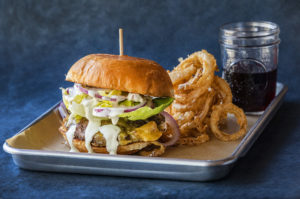 There’s been much grumbling in the online food world after San Francisco Chronicle food critic Michael Bauer jabbed a crooked-tined fork at perennial Wine Country favorite, Bistro Jeanty last December.
There’s been much grumbling in the online food world after San Francisco Chronicle food critic Michael Bauer jabbed a crooked-tined fork at perennial Wine Country favorite, Bistro Jeanty last December.
Though the restaurant had earned a Michelin star, was a fixture on the Chronicle’s own Top 100 and is a French bistro icon in Yountville, Bauer’s scathing review of the once-loved restaurant — from bent silverware to cold food and raw pork — has many of the restaurant’s fans up in arms.
Others, however, wonder why it took Bauer so long to point out what they’ve also seen as the restaurant’s decline in quality over the years.
But who’s right? The answer may be…everyone.
In the past, food critic’s words were pretty much the definitive opinion of a restaurant, if for no other reason that dissenting voices didn’t have an opportunity to do much but grumble to themselves. Critics like Michael Bauer, Gael Greene and Ruth Reichl had the power to make or break a chef and all but close down a restaurant with a flick of the pen.
That’s not the case anymore. Though critics can certainly wield influence, shine a spotlight on an unknown restaurant or cause some serious panic with a bad review, their words no longer go unchecked.
The rise of Yelp, Chowhound and hundreds of other food blogs, not to mention the comments section of their own newspapers, throw into question even the most powerful of food critics. Chefs can give their own side of the story in a very public way. Fans can challenge negative assumptions. Naysayers can undermine positive reviews. And most of it is anonymous, so we can’t always know if commenters simply have an axe to grind (with us or the restaurant).
It’s a brave and scary world out there.
Things are changing. Quickly. On the rise is a new kind of dining journalism — tapping into the community and making the whole process a bit more democratic. For better or worse.
Gone are the days of wigs and costumes for “anonymous” critics. Any critic who thinks they’re not recognized (and thereby getting a “real” experience) is severely deluded — most chefs and staff know the second they walk in. As with Bauer’s review, that doesn’t always translate to a great meal, even when they do see you coming. But by the time a critic gets there (usually waiting 4-6 weeks after opening) it’s too late.
Bloggers get the word is out almost the second a restaurant opens. You’re open, you’re being blogged. Anyone with a camera and a website can have as much influence on a restaurant as anyone else. Unlike print newspapers, the online world has a long memory and a Google search can turn up a whole lot of information quickly — usually to the one who has the best search engine optimization rather than the most relevant opinion.
To that end, number of newspapers have recently lost experienced critics and are either not replacing them or are hiring less experienced (read cheaper) writers to put together shorter, one-visit “experience” pieces rather than tradition “go three times, anonymously, order everything on the menu” criticisms. They can’t afford the time or the money. Websites are relying on forums and comments to flesh out their reviews.
And we’re all painfully aware that with dwindling ad revenues, it’s a cat and mouse game when an unchecked critic writes a deadly review and pisses off advertisers. It’s a game fewer and fewer newspapers are willing to play.
Which isn’t to say they’re not always justified. Criticism is an insanely subjective thing. Sometimes I have crummy meals at great restaurants, other times I have great meals at crummy restaurants. Sometimes I just don’t like the food. Sometimes I’m having a bad day. Sometimes the restaurant is. I don’t always get it right. Neither does anyone else. That’s what criticism is.
What worries those who get paid to have an opinion is the amount of bad information that’s out there. Not every write-up should be a glowing one or a nasty one. It should be fair and balanced, truthful and critical when need be. True journalists spend our lives learning how to be fair and accurate (even if you disagree) in our writing. Our jobs are on the line if we mess up and our real names are attached to what we write.
It is a bit sad to me to think that we may ultimately lose the voices of well-seasoned restaurant veterans to the din of the masses. Bauer (right or wrong) knows food. It’s sad to me that great food writers are finding smaller and smaller audiences. Because sometimes the masses are wrong. But it’s the way things are going.
Frankly, though. I see hope for the future. I like shorter reviews that don’t preach at me or make me feel stupid for not knowing what salsify is.
I get that my opinion is no more or less valuable than most others. I may have a little more eating experience than most folks (mostly because I get to eat out on someone else’s dime) — though that’s not necessarily true. I may have a bigger audience to tell people what I think — though again, not always true. I just happen to have a soapbox and a big appetite. I’m riding this train as long as I have fingers to type.
I’ve always thought that well-thought-out reader comments hold as much (if not more) power than my own reviews. Well-thought-out. Not the raving lunatics or PR people posing as commenters. The regular folks who have real-life opinions. Because word-of-mouth is the most influential decider on where people go out to eat. Not critics.
I simply start the conversations–you finish them.
In the end, there will always be critics of some sort. Trained or not. You can agree or disagree. Read it or don’t.
But all those of us who earn a paycheck trying to boil down information can do is hope that our voices continue to remain relevant — even if they’re no longer definitive. Engaging with the readers rather than creating a one-way conversation from behind our computers. Whether we like it or not.
What’s your take on food critics? Do you think they’re fair? Do you value their opinions? Have it out in a civilized fashion.









